Hull Surname Ancestry ResultsOur indexes 1000-1999 include entries for the spelling 'hull'. In the period you have requested, we have the following 1176 records (displaying 151 to 160): Single Surname Subscription | | | Buying all 1,176 results of this search individually would cost £6,598.00. But you can have free access to all 1,176 records for a year, to view, to save and print, for £100. Save £6,498.00. More... |
These sample scans are from the original record. You will get scans of the full pages or articles where the surname you searched for has been found. Your web browser may prevent the sample windows from opening; in this case please change your browser settings to allow pop-up windows from this site. Prerogative Court of Canterbury Wills: Suffolk: Testators
(1658)
William Brigg compiled abstracts of all the wills in Register "Wootton" of the Prerogative Court of Canterbury. The abstracts of those proved in 1658 were published by him in 1894. The court's main jurisdiction was central and southern England and Wales, as well as over sailors &c dying abroad. We have re-indexed the whole volume, county by county, for both testators and strays (legatees, witnesses and other persons mentioned in the abstracts). HULL. Cost: £4.00.  | Sample scan, click to enlarge
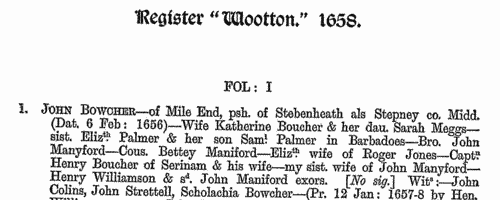
| Lawyers and officers of Lincoln's Inn
(1586-1660)
Lincoln's Inn is one of the ancient inns of court in London exclusively invested with the right to call lawyers to the English bar. The Black Books of Lincoln's Inn are the main administrative records of the society, containing the names of those filling the different offices year by year; the annual accounts of the Pensioner and the Treasurer; regulations; punishments and fines for misdemeanours. This edition, printed for the inn in 1898, covers the volumes from the 20th year of the reign of queen Elizabeth to the end of the Protectorate, supplemented by material entries from another series, called the Red Books, surviving from 1614, which deal with orders concerning and admittances to the chambers of the inn.HULL. Cost: £4.00.  | Sample scan, click to enlarge
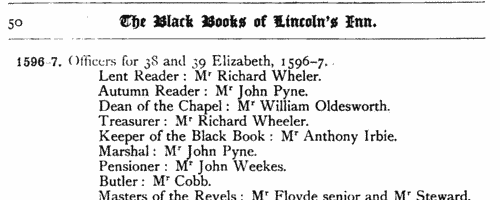
| London Marriage Allegations
(1611-1660)
London, Essex and part of Hertfordshire lay within the diocese of London. In the later 17th century the individual archdeaconry courts issued marriage licences, but for this period the only surviving material is from the overarching London Consistory court. The main series of marriage allegations from the consistory court was extracted by Colonel Joseph Lemuel Chester, and the text was edited by George J. Armytage and published by the Harleian Society in 1887. A typical later entry will give date; name, address and occupation of groom; name, address and condition of his intended bride, and/or, where she is a spinster, her father's name, address and occupation. Lastly we have the name of the church where the wedding was going to take place. For the later years Colonel Chester merely picked out items that he thought were of interest, and his selections continue as late as 1828, but the bulk of the licences abstracted here are from the 17th century.HULL. Cost: £4.00.  | Sample scan, click to enlarge

| Royalist delinquents in county Durham and Northumberland, their successors, tenants, debtors and creditors
(1648-1660)
King Charles I was executed 30 January 1649, the kingship was abolished and government by a Council of State was established 14 February 1649. Oliver Cromwell became Lord Protector 16 December 1653; died 3 September 1658; and was succeeded by his son Richard, who abdicated 24 May 1659. Charles II was established on the throne 29 May 1660. From 1648 to 1660 parliament sequestrated royalists' estates, restoring many by a process of heavy fines called compounding; this was administered by the Committee for Compounding, working through county committees. These raised considerable amounts of money, money which was vitally necessary for maintaining the parliamentary army's campaigns to subdue opposition in the three kingdoms - England, Scotland and Ireland. The raising and delivery of these monies was the responsibility of the Committee for Advance of Money (C. A. M.). The records of these committees were detailed and extensive, amounting to about 300 volumes, and were calendared for the Public Record Office by Mary Anne Everett Green. Abstracts of the county Durham and Northumberland entries were collated by Richard Welford with a manuscript transcript of the proceedings of the parliamentary commissioners in county Durham surviving in Durham cathedral library, and published by the Surtees Society in 1905. The persons named in these abstracts are not only the delinquents themselves, and those who succeeded them in their estates, but tenants, debtors and creditors, and local constables and officials of the committees.HULL. Cost: £4.00.  | Sample scan, click to enlarge

| English administration of Ireland
(1660-1662)
The State Papers relating to Ireland (preserved in the Public Record Office in England) from the restoration of the monarchy in June 1660 to December 1662 were calendared by R. P. Mahaffy and published in 1905. Most of the volume contains abstracts of correspondence with the Lord Lieutenant and other officials: but the first 150 pages consists of petitions made, upon the restoration, for lands, offices, &c. that had been lost during the Commonwealth period. There is also an abstract of the contents (pages 648 to 660) of a thin manuscript book among the papers, containing petitions and papers relating to the estate of the Marquis of Antrim, which had been divided up among English and Irish Protestant soldiers and 'adventurers' and was now again in contention.HULL. Cost: £4.00.  | Sample scan, click to enlarge
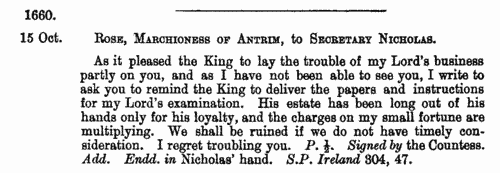
| Early settlers of Connecticut
(1636-1665)
The colony of Connecticut was settled in 1633 by emigrants from Massachusetts. The modern state of Connecticut also includes the colony of Newhaven. The seat of government of Connecticut was established in 1635 at Newtown (Hartford), on the site of a Dutch fort. The first volume of the Connecticut colony records is in three parts: 1, the records of the General and Particular Courts from April 1636 to December 1649; 2, Copy wills and probate inventories; 3, Grants and Conveyances of Lands, mostly from 1662 to 1690. The second volume of the records contains the minutes of the General Court from February 1650 to October 1669. In accordance with a resolution of the General Assembly, J. Hammond Trumbull transcribed the whole of the surviving court records as far as May 1665 (the union with Newhaven colony), with the probate material from 1640 to 1649, and these were published as 'The Public Records of the Colony of Connecticut' in 1850.HULL. Cost: £4.00.  | Sample scan, click to enlarge
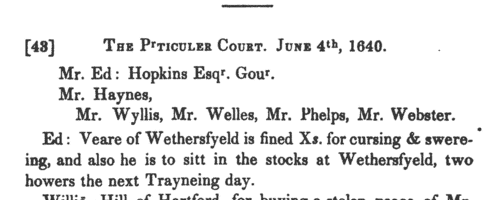
| Oxford householders
(1665)
Hearth tax was raised by assessing each householder on the number of chimneys to the dwelling. This provided a simple way to make a rough judgment as to the value of the dwelling. In Oxford the returns were made by ward, and then by parish. The return for 1665 (164/154) was edited by J. E. Thorold Rogers and printed for the Oxford Historical Society in 1891. The Roman numerals given are the numbers of hearths: where two or more people are grouped together with one number, it may be assumed that they were heads of separate households sharing a single building with that number of chimneys. Full names are given: only in a few instances is occupation given, nor are the streets indicated; however, there were thirteen ancient parishes in the city, none being very extensive, so a fairly good indication of location is given by the parish name.HULL. Cost: £6.00.  | Sample scan, click to enlarge

| Middlesex Conventiclers
(1625-1666)
Incidents from the Middlesex Sessions Books. These are abstracts of sessional orders, minutes of criminal cases, memoranda and other entries of record taken from the volumes of Gaol Delivery Register, Books and Rolls, Sessions of Peace Register, and Process Books of Indictments for the county of Middlesex from the death of king James I to the Great Fire of London. The references at the end of each item indicate the volume in question, the abbreviations being G. D. for Gaol Delivery, S. P. for Sessions of Peace, and S. O. T. for Session of Oyer and Terminer; occasionally preceded by S. for Special or G. for general, or followed by R. for Roll or Reg. for Register. It should be noted that, in the case of 'true bills' or indictments, the abstract starts with the date on which the offence took place, the date of the conviction &c. being at the end of the entry. Conventiclers, that is religious non-conformists who persisted in holding illegal services or conventicles, feature throughout the records: C. C. C. stands for Certificate of Convictions of Conventiclers. These abstracts, prepared by John Cordy Jeaffreson for the Middlesex County Record Society, are far from being a complete calendar of these extensive records; his purpose was, in part, to notice 'every parchment that should exhibit a famous person's name or any other feature of personal interest'. Being unable to print in full the longer lists of the conventiclers and recusants recorded, he ignores 'those persons who appear from their descriptions to have been of humble degree'.HULL. Cost: £4.00.  | Sample scan, click to enlarge
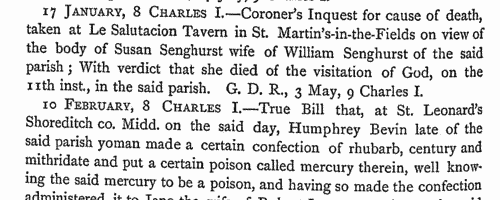
| Middlesex Sessions
(1625-1666)
Incidents from the Middlesex Sessions Books. These are abstracts of sessional orders, minutes of criminal cases, memoranda and other entries of record taken from the volumes of Gaol Delivery Register, Books and Rolls, Sessions of Peace Register, and Process Books of Indictments for the county of Middlesex from the death of king James I to the Great Fire of London. The references at the end of each item indicate the volume in question, the abbreviations being G. D. for Gaol Delivery, S. P. for Sessions of Peace, and S. O. T. for Session of Oyer and Terminer; occasionally preceded by S. for Special or G. for general, or followed by R. for Roll or Reg. for Register. It should be noted that, in the case of 'true bills' or indictments, the abstract starts with the date on which the offence took place, the date of the conviction &c. being at the end of the entry. These abstracts, prepared by John Cordy Jeaffreson for the Middlesex County Record Society, are far from being a complete calendar of these extensive records; his purpose was, in part, to notice 'every parchment that should exhibit a famous person's name or any other feature of personal interest'.HULL. Cost: £4.00.  | Sample scan, click to enlarge
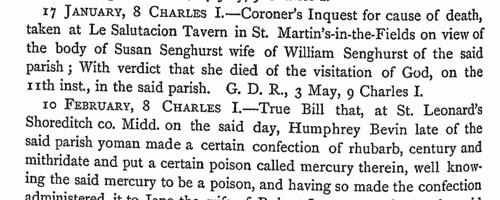
| Inhabitants of Reading in Berkshire
(1550-1667)
The borough of Reading in Berkshire comprised three ancient parishes - St Giles, St Lawrence and St Mary. The churchwardens' accounts of Reading St Mary from 1550 to 1667 were transcribed by Francis N. A. Garry and A. G. Garry and published in 1893. The accounts, usually signed off by the two churchwardens and two surveyors of the highways for the year, listed the income and expenditure of the church. Income included annual payments for seats in the pews; rents from church property; fees for the use of the pall and for tolling the knell (knill) at funerals, and for opening graves; and sums received for 'gatherings', i. e. money gathered from communicants at Easter, Hocktide, Mayday, Hallowmas, Christmas and Whit. Expenditure was largely on maintaining the church fabric, and paying the minor officials - most of the names found on this side of the account are of local workmen busy with repairs.HULL. Cost: £4.00.  | Sample scan, click to enlarge
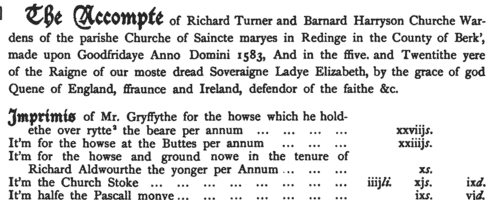
|
Research your ancestry, family history, genealogy and one-name study by direct access to original records and archives indexed by surname.
|












